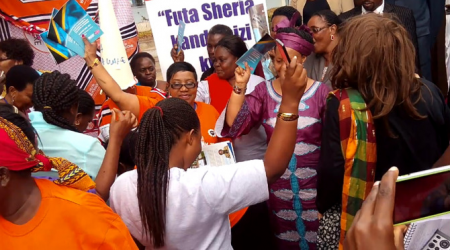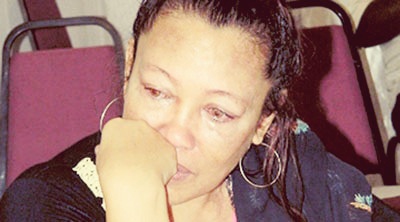Elimination of Discrimination against Women in Tanzania
The Committee on the Elimination of Discrimination against Women met on February 26, 2016, in Geneva and considered the combined seventh and eighth periodic reports of Tanzania on its implementation of the provisions of the Convention on the Elimination of All Forms of Discrimination against Women CEDAW.
Presenting the reports, Modest J. Mero, Permanent Representative of Tanzania to the United Nations Office at Geneva, said that Tanzania was fully committed to its obligations under the Convention and was making efforts to improve its legal environment accordingly. It had established a Gender Mainstreaming Working Group, which had contributed to the review of cost sharing aspects in maternal health, leading to improved maternal services and an increased budget for combatting gender violence. The Government continued to promote women’s economic empowerment and representation at the political level, and it had taken measures to eliminate female genital mutilation and other harmful practices, such as early marriages. It had also undertaken numerous measures and actions to combat discrimination against persons with albinism.
In the ensuing dialogue, Committee Members welcomed the Government’s commitment to improve health services, women’s representation and to combat harmful practices. They expressed concerns, however, about the absence of comprehensive legislation addressing violence against women, as well as the existence of legal and customary norms that discriminated against women, particularly in the fields of family, inheritance and land ownership. The situation in rural areas was of particular concern for Committee Members, where harmful practices, lack of access to services, and unemployment were still widespread. Experts also noted with concern the lack of budget allocations dedicated to health, education and employment. Finally, they referred to an individual communication concerning Tanzania and expressed regrets that Tanzania had not implemented the Committee’s conclusions on that case, in violation of its obligations under the Optional Protocol to the Convention.
High level officials from Tanzania to the meeting expressed Tanzania’s commitment to the implementation of the Convention in all parts of the country.
In her closing remarks, Yoko Hayashi, Chairperson of the Committee, commended Tanzania’s efforts and encouraged the implementation of the recommendations which would be formulated by the Committee.
The delegation of Tanzania included representatives from the governments of the URT and the Revolutionary Government of Zanzibar; and of the Permanent Mission of Tanzania to the United Nations Office at Geneva.
The combined seventh and eighth periodic reports of Tanzania can be read here: CEDAW/C/TZA/7‑8.
Presentation of the Reports
MODEST J. MERO, Permanent Representative of Tanzania to the United Nations Office at Geneva, presenting the reports, expressed his full support for the work of the Committee and recognized the invaluable contribution of non-governmental organizations. Tanzania was fully committed to its obligations under the Convention and its Optional Protocol, and was currently undertaking broad consultations on the amendment to article 20(1) with a view to implementing its aspirations as soon as practicable. In mainstreaming gender issues into the national development frameworks, the Government was reflecting Goal 5 of the Sustainable Development Agenda, which underscored the importance of achieving the equality and empowerment of all women and girls. The Government was undertaking a review of the National Strategy for Growth and the Reduction of Poverty with a view to developing strategies to address gender issues. Tanzania was making efforts to improve its legal environment and was implementing a number of plans to eradicate violence against women and children, including in Zanzibar.
The Government had established a Gender Mainstreaming Working Group, comprised of various stakeholders, to influence the process of gender mainstreaming and the allocation of more resources to gender equality and women’s empowerment in both Zanzibar and the mainland. The Working Group had contributed to the review of cost sharing aspects in maternal health, leading to improved maternal services and an increased budget for combatting gender violence. Similarly, the group was engaged in mainstreaming gender policies in Zanzibar, and recently engaged in reviewing MKUZA II with a gender perspective. The Women Development Fund, the Zanzibar Economic Empowerment Fund, the Women Entrepreneur Development Trust Fund and the Tanzania Women’s Bank had empowered women economically and provided women entrepreneurs with soft loans. Furthermore, the Government ensured that the proportion of seats held by women in Parliament continued to increase, amounting to 102 in 2010. The proposed constitution aimed at achieving equal representation within Parliament. Meanwhile, the ratio of women judges and magistrates had increased from 8 per cent in 2005 to 50 per cent in 2015.
The Government had taken measures, including media campaigns, to eliminate female genital mutilation through criminalizing the offense under the Penal Code and implementing a National Plan of Action to accelerate its eradication. The prevalence of female genital mutilation was estimated at 15 per cent and as high as 60 per cent in some regions. In its efforts to end child marriage, the Government had enacted a Law of the Child Act which amended the Law of Marriage Act, replacing the definition of a child as any person under 18. Perpetrators of child marriage could now be prosecuted through that law. The Government had adopted a law, regulations, and an action plan to combat trafficking in persons. It had also undertaken numerous measures and actions to combat discrimination against persons with albinism, including media outreach and efforts to prosecute the perpetrators. The Government had embarked on the review of the Witchcraft Act and Alternative Medicine Act.
Questions by the Experts
An Expert recalled that the Committee had already in the past expressed concerns over the non-incorporation of the Convention into Tanzania’s domestic legal framework, and had also urged Tanzania to adopt a definition of discrimination that was in line with the Convention. Unfortunately, those recommendations had not yet been implemented, and a number of important reforms continued to be postponed until the Constitutional process was finalized. The legislation and customary law continued to contain discriminatory provisions, particularly with regards to family laws, divorce and the division of properties. Furthermore, the legislation on marriage and the Law on the Child contained different definitions of a child, and set different minimum ages to marry. Would Tanzania harmonize its customary laws?
Access to justice also remained a problem, and the Government should implement the Committee’s recommendations on that issue. An Expert asked how Tanzania’s judges and lawyers were trained on the provisions of the Convention in a systematic way.
Noting that the Committee had issued conclusions in February 2015 on an individual communication under the Optional Protocol to the Convention regarding a citizen of Tanzania, an Expert asked how the Government made sure that its recommendations were implemented.
Replies by the Delegation
The implementation of the Convention was an incremental process, and resources were needed. The Government had raised awareness on the Convention through capacity-building activities targeting judicial personnel. It had translated it into Swahili to ensure that the population could understand the Convention. In addition, human rights education was provided in schools.
Article 53 of the new Convention would address discrimination, and would clearly state that all discriminatory customary provisions had to be repealed. In the meantime, the Government had enacted a number of laws to ensure protection from discrimination. The Law of the Child Act had amended the definition of a child that was provided in the Marriage Act, and now prevailed over its provisions. Women could inherit equally. The legal system prevailed over the customary laws.

Regarding access to justice, the laws were not discriminatory, a delegate said. There were challenges regarding women’s knowledge of their rights under the Convention, and the Government was conducting awareness-raising activities in that regard. The Legal Aid Bill was pending approval by the Cabinet and would hopefully be adopted during the next parliamentary session.
“Together We Can Make it Happen”
Leila Sheikh














Comments (3)
Thanks Tz for having moved in line with women’s rights
Asante
Your comments are important.
Leila